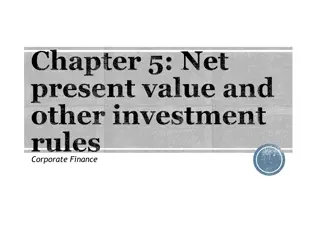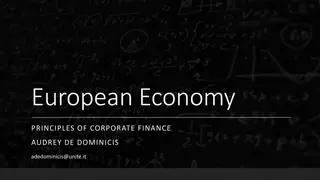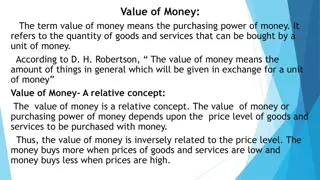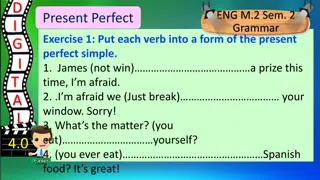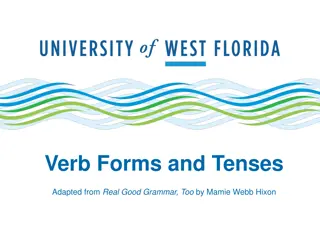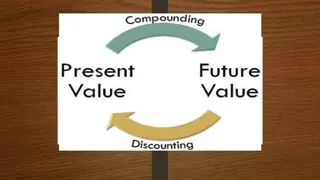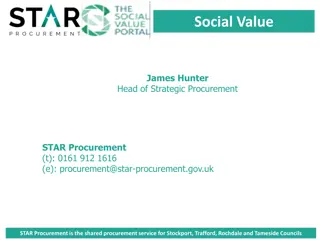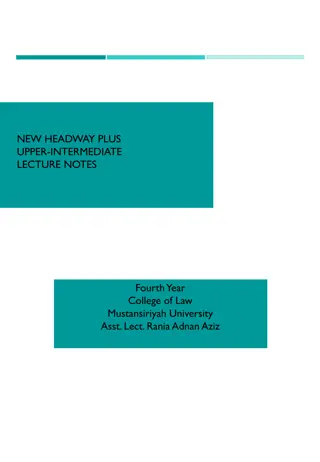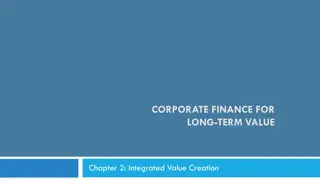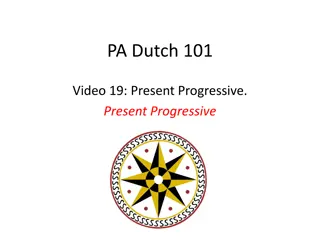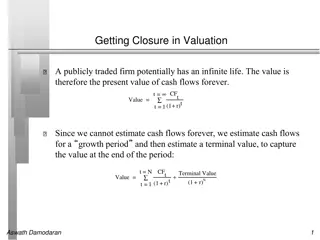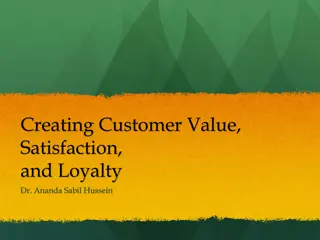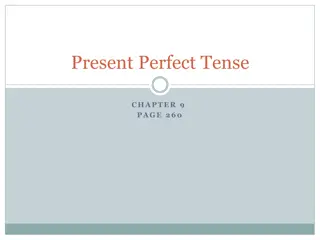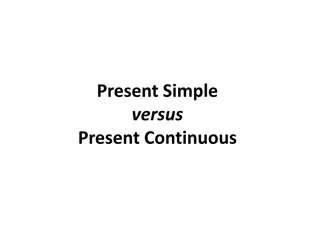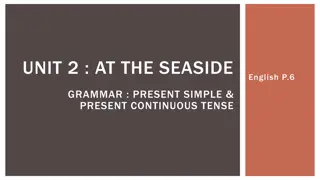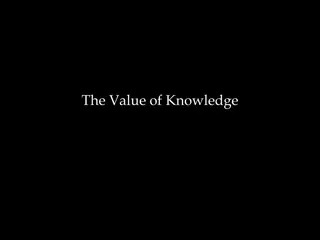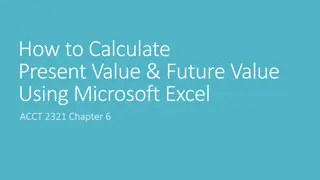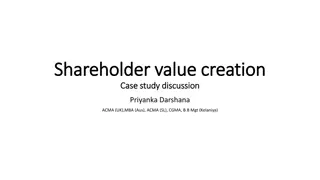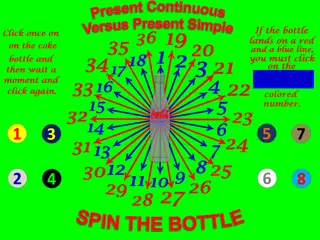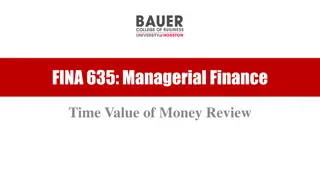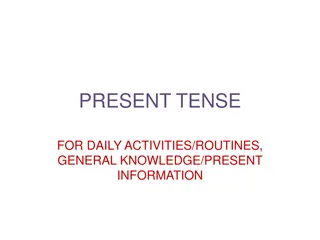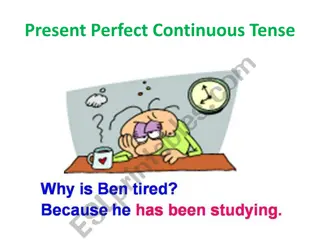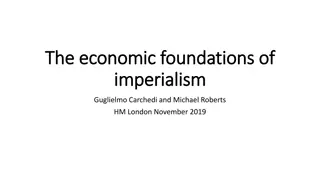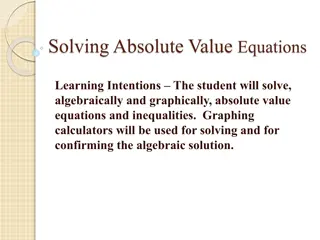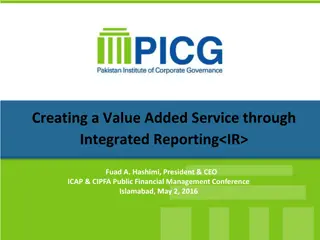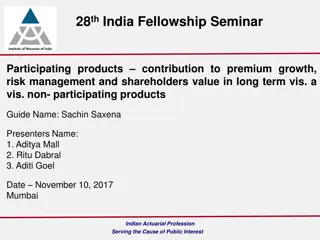ECC Social Value Reporting and Evaluation Framework
Essex County Council (ECC) has implemented a robust Social Value Reporting and Evaluation framework based on the Local Government Association's National TOMs method. This framework categorizes and assesses social value contributions in two parts - Value Score and Supporting Statement Score - to deri
3 views • 16 slides
English Grammar Exercises: Simple Present and Present Progressive
Practice forming sentences in simple present and present progressive tenses through a series of exercises. The exercises include questions, affirmatives, negatives, and short forms of the verb "to be." Improve your English grammar skills with these interactive tasks.
3 views • 14 slides
Understanding Net Present Value (NPV) in Corporate Finance
Explore the concept of Net Present Value (NPV) and other investment rules in corporate finance, including NPV calculation, decision criteria, judging the NPV rule, and project evaluation using NPV. Learn how to analyze proposed projects, weigh their future cash flows against initial costs, and make
0 views • 40 slides
Understanding Present and Future Value in Corporate Finance
Explore the principles of corporate finance through key concepts like present value, future value, and interest rates. Learn how to calculate the worth of money over time and make informed investment decisions based on these fundamental financial principles.
0 views • 37 slides
Understanding the Value of Money and Standards
The value of money refers to its purchasing power, which is influenced by the price level of goods and services. Different standards, such as wholesale, retail, and labor, help measure the value of money. Money can have internal and external value, affecting domestic and foreign transactions. The Qu
0 views • 62 slides
Present Perfect Exercises for Grammar Practice
These exercises focus on using the present perfect simple tense correctly in various contexts. The exercises require completing sentences with verbs in the present perfect form, inserting time words or phrases, and transforming sentences to convey the same meaning. Through these exercises, learners
0 views • 12 slides
Understanding Verb Forms and Tenses in English Grammar
Learn about verb forms and tenses in English grammar, including the five forms of every English verb, the differences between regular and irregular verbs, and how to use verb tenses such as present, present perfect, and present participle. Discover how to apply present tense in various contexts and
1 views • 15 slides
Present Perfect for Giving News: Verb-Noun Collocations and Usage
Study materials on using the Present Perfect tense for sharing news with just, yet, and already. Practice exercises in verb-noun collocations and identifying incorrect words. Explore examples of news messages and answer related questions. Learn how to express events that are connected to the present
1 views • 5 slides
Discounts and Present Value in Financial Mathematics
Explore the concept of discounts and present value in financial mathematics by learning how to calculate and apply them using simple and compound interest. Various examples are provided to understand the calculations involved in determining present value and discounts in different scenarios. Improve
0 views • 22 slides
Understanding Work Placements and Present Perfect Tense
Work placements provide valuable work experience opportunities for individuals looking to enhance their career prospects. This lesson explores the concept of work placements, their benefits, and how they can lead to job opportunities. Additionally, it covers the usage of the present perfect tense in
0 views • 8 slides
Understanding Techniques of Time Value of Money
Techniques of Time Value of Money include compounding and discounting. Compounding calculates future value while discounting determines present value. Learn how these techniques impact cash flows and investments.
0 views • 5 slides
Enhancing Social Value through Strategic Procurement
STAR Procurement, the shared service for multiple councils, emphasizes the importance of Social Value in procurement practices. The Social Value Portal serves as a management tool to measure and demonstrate the benefits of Social Value commitments. Bidders are required to provide quantitative and qu
0 views • 14 slides
Understanding the Present Perfect Tense in English Grammar
The lecture notes explore the Present Perfect tense, highlighting its connection between past actions and their relevance in the present. It compares the Past and Present Perfect tenses, discussing the nuanced differences and providing examples for clarity. The document covers the usage of the Prese
0 views • 8 slides
Integrated Value Creation in Corporate Finance
Explore the concept of integrated value creation in corporate finance, emphasizing the importance of managing for long-term value while incorporating social and environmental goals. Learn about responsible management practices that focus on creating net present value (NPV) through a balance of finan
0 views • 38 slides
Understanding Articles and Present Perfect Tense
Articles such as "a, an, the" help indicate specificity in nouns, while the present perfect tense is used to describe actions linking past and present. Learn how to correctly use articles and form questions in the present perfect tense.
0 views • 11 slides
Learning Present Progressive in PA Dutch
Explore the concept of Present Progressive in PA Dutch through examples and practice exercises. Understand the differences between the two present tense forms and learn how to form sentences in Present Progressive. Practice translating sentences using both normal conjugation and the Present Progress
0 views • 7 slides
Understanding Terminal Value in Valuation
Valuation of publicly traded firms with potentially infinite lives involves estimating cash flows for a growth period and a terminal value to capture value at the end. The stable growth rate, which cannot exceed the economy's growth rate, plays a crucial role in determining the present value of futu
0 views • 8 slides
English Grammar Exercises: Simple Present and Present Progressive
Practice your understanding of simple present and present progressive tenses with various exercises in this content. From forming questions to using short forms of "be" in sentences, enhance your grammar skills. Engage with exercises on verb conjugations, sentence structure, and word order to streng
1 views • 24 slides
Understanding the Present Perfect Simple Tense and Its Usage
Learn about the basic rules, formation, and usage of the Present Perfect Simple tense in English. Explore how to form the tense, use shortened forms, understand when to use "have" and "has" with past participles, differentiate between Present Perfect and Past Simple, know when to use the Present Per
0 views • 11 slides
Understanding Verb Tenses: Present Perfect and Past Perfect Forms
Explore the usage of present perfect and past perfect verb forms to indicate relationships of time and cause. Present perfect verbs denote actions with undefined past timing but relevance to the present, while past perfect verbs describe events that occurred before another past event. Examples and e
0 views • 7 slides
Understanding the Present Perfect Tense in English Grammar
The present perfect tense in English grammar is a combination of the present tense and perfect aspect used to express past events with present consequences. It is formed using the auxiliary verb "have" and the past participle of the main verb. This tense is essential for indicating completed actions
0 views • 27 slides
Maximizing Customer Value, Satisfaction & Loyalty in Business
Explore the essence of customer value, satisfaction, and loyalty in business success through Dr. Ananda Sabil Hussein's insightful perspective. Learn about customer perceived value, determinants of value, steps in value analysis, loyalty definitions, satisfaction measurements, and the significance o
0 views • 18 slides
Understanding the Present Perfect Tense - Chapter 9
The present perfect tense is used for actions or situations that occurred at an unspecified time in the past, repeated actions at unspecified times, ongoing actions from the past to the present, and more. Time expressions like "for" and "since" are essential in specifying durations and starting poin
0 views • 7 slides
Understanding the Difference Between Present Simple and Present Continuous Tenses
Present Simple and Present Continuous tenses serve different purposes in English grammar. The Present Continuous is used for actions happening at the moment, longer actions in progress, and future plans. On the other hand, the Present Simple is used for repeated actions and facts/generalizations. Re
0 views • 18 slides
Learning Present Simple and Present Continuous Tenses at the Seaside
Explore the usage of present simple and present continuous tenses through examples and exercises related to everyday activities at the seaside. Understand how to form sentences in these tenses and differentiate between them based on ongoing actions or habitual activities. Practice completing sentenc
0 views • 51 slides
The Value of Knowledge: A Philosophical Exploration
Exploring the value of knowledge through the lens of Plato's Meno Problem, this text delves into why knowledge is considered more valuable than mere true belief. It discusses Plato's solution to the problem, the secondary and tertiary value problems, and constraints on solutions and strategies in un
0 views • 22 slides
How to Calculate Present Value & Future Value Using Microsoft Excel
Learn how to calculate present value and future value using Microsoft Excel functions such as PV and FV. Understand the syntax, arguments, and examples for determining the value of single amounts, annuities, and lump sums. Step-by-step instructions provided for efficient financial calculations.
0 views • 14 slides
Exploring Land Value Return and Recycling for Transportation Funding
With transportation investment needs surpassing available resources, investigating the potential of land value return and recycling as a revenue source can benefit public agencies. This involves recovering and reusing a portion of the increased land value generated by public investment in transporta
0 views • 33 slides
Maximizing Shareholder Value Creation Through Strategic Business Practices
Explore the concept of shareholder value creation, the importance of generating revenues exceeding economic costs, and meeting shareholders' expectations. Learn about Economic Value Added (EVA), key value drivers, aligning strategy with value creation, and essential factors for overall business succ
0 views • 11 slides
Understanding Trade in Value-Added (TiVA) and Global Value Chains
Trade in Value-Added (TiVA) offers crucial insights into the complexities of global value chains and economic globalization. By shifting focus from gross trade statistics to value creation along supply chains, TiVA helps in formulating better policies and addressing systemic risks associated with ma
0 views • 22 slides
Understanding Present Continuous and Present Simple Tenses with Examples
Explore the differences between Present Continuous and Present Simple tenses through various examples like sitting, liking, wanting, walking, running, going, eating, studying, playing, drinking, reading, and talking. Each example is illustrated with an image and a description, making it easier to gr
0 views • 37 slides
Managerial Finance: Time Value of Money Review
This review delves into scenarios involving cash flows, future value, and present value calculations at different time periods and interest rates. It covers calculations for future cash flow values, present values, and investment decisions based on revenue projections and interest rates. The example
0 views • 25 slides
Understanding the Present Perfect Tense in English Grammar
Explore examples of using the present perfect tense in English grammar, including how to discuss experiences, use of "never" and "ever," and distinguishing between past simple and present perfect. Learn how to correctly form sentences and ask questions in the present perfect tense.
0 views • 24 slides
Present Tense: Daily Activities & Information
Explore the present tense for daily routines, general knowledge, and current information in this informative content. Discover what activities are usually done on Saturday evenings and Sunday mornings, learn about the ministers in charge of Maritime and Fisheries Affairs and Agriculture, and get fam
0 views • 10 slides
Understanding the Present Perfect Continuous Tense
The Present Perfect Continuous Tense is used to emphasize the duration of an action that started in the past and continues up to the present, indicating ongoing actions with time expressions like 'for,' 'since,' 'all morning,' etc. Learn how to use this tense correctly and distinguish it from the Pr
1 views • 10 slides
Economic Foundations of Imperialism: Exploitation and Value Transfer
Imperialism primarily functions as an economic mechanism for exploiting value rather than seeking political dominance. The transfer of value occurs through mechanisms like unequal exchange, global value chain flows, and capital flows, leading to the long-term appropriation of value by imperialist na
0 views • 28 slides
Department of biology
The present continuous tense, also known as the present progressive tense, is used to describe ongoing actions or events happening in the present. It is formed by using the present tense of the verb "to be" followed by the -ing form of the main verb. Learn about forming positive, negative, and quest
0 views • 5 slides
Understanding Absolute Value Equations and Inequalities
In this lesson, students will learn to solve absolute value equations and inequalities both algebraically and graphically. The concept of absolute value, which represents the distance between a number and zero on the number line, is explained through examples and solutions. The importance of using g
0 views • 43 slides
Business Model Reporting for Value Creation
Integrated Reporting (IR) plays a crucial role in forging business partnerships and facilitating sound decision-making. Understanding the organizational business model is essential for long-term sustainability and value creation. The global approach to business model reporting encompasses business s
0 views • 42 slides
India Fellowship Seminar: Product Contributions to Growth, Risk Management, and Shareholder Value
India Fellowship Seminar discussed the contributions of participating and non-participating products to premium growth, risk management, and shareholder value. Key topics included market trends, drivers of shareholder value, PAR vs NPAR attractions, creating shareholder value, and risk management st
0 views • 21 slides


